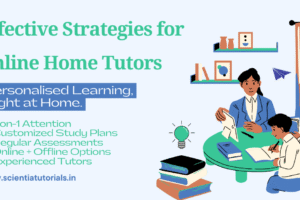Empowering Students for Success: Teaching Tips for Home Tutors on Critical Study Skills
Introduction
In today’s fast-paced educational environment, teaching students how to study effectively is crucial for their long-term academic success. As a home tutor, you play an essential role in not just imparting knowledge, but also equipping your students with the critical study skills necessary for mastering their coursework and excelling in exams. This article explores various teaching tips for home tutors on instilling effective study habits, organizational skills, time management strategies, and methods for fostering a growth mindset in students.
The Importance of Critical Study Skills
Before diving into the specific tips and strategies, it’s essential to understand why critical study skills are vital:
- Enhanced Retention: Good study skills help students retain information better, leading to improved performance on tests and assignments.
- Increased Confidence: Mastering study techniques can boost students’ confidence, making them more willing to tackle challenging subjects.
- Lifelong Learning: By teaching students how to study effectively, you are equipping them with tools they can use throughout their academic journey and in their future careers.
Assessing Students’ Current Study Habits
Before implementing new study techniques, it’s crucial to assess your students’ existing study habits:
- Conduct a Study Habits Survey: Create a simple questionnaire to determine how often they study, where they study, and what methods they currently use.
- Identify Strengths and Weaknesses: Analyze the survey results to pinpoint areas where they excel and areas that require improvement.
- Discuss with Students: Have an open conversation with your students about their current study habits, encouraging them to share what works for them and what doesn’t.
Key Study Skills to Teach
1. Time Management
Effective time management is fundamental to academic success. Here’s how you can teach it:
- Create a Study Schedule: Help students develop a weekly study schedule that allocates specific time blocks for each subject. Ensure they balance their time between studying, homework, and leisure activities.
- Prioritize Tasks: Teach students how to prioritize their tasks based on deadlines and difficulty levels. A simple priority matrix can be helpful—label tasks as urgent, important, or less critical.
- Use Time-Blocking Techniques: Introduce techniques like the Pomodoro Technique, where students study for 25 minutes and then take a 5-minute break. This can enhance focus and productivity.
2. Organizational Skills
Being organized can significantly affect a student’s ability to study effectively. Here are some strategies:
- Create a Study Space: Help students design a clutter-free study area that is dedicated solely to their academic work. This space should be well-lit, quiet, and stocked with necessary supplies.
- Utilize Planners and Digital Tools: Encourage students to use planners or digital tools (like Google Calendar or apps like Todoist) to keep track of assignments, due dates, and exam schedules.
- Teach Note-taking Techniques: Introduce various note-taking methods such as the Cornell Method, mind mapping, or outlining. Help students find a style that works best for them.
3. Reading and Comprehension Skills
Improving reading and comprehension skills is vital for academic success across all subjects. Here’s how to foster these skills:
- Active Reading Techniques: Teach students to annotate their texts while reading, highlighting key points, and writing notes in the margins. This promotes engagement with the material.
- Summarization Skills: Encourage students to summarize what they have read in their own words. This helps reinforce understanding and retention.
- Discussion-Based Learning: Incorporate discussion sessions where students can talk about what they have read. Engaging in dialogue helps deepen comprehension and exposes them to different perspectives.
4. Critical Thinking and Problem-Solving
Critical thinking skills are essential for students to analyze information and develop solutions. Here’s how to enhance these skills:
- Encourage Questions: Promote a questioning mindset by encouraging students to ask why and how, rather than just accepting information at face value.
- Use Real-World Problems: Present real-life problems related to the subject matter and have students brainstorm solutions. This fosters creativity and critical analysis.
- Practice Debates: Introduce structured debates on various topics. This not only encourages critical thinking but also enhances public speaking and persuasive skills.
Cultivating a Growth Mindset
A growth mindset is the belief that abilities and intelligence can be developed through dedication and hard work. Here’s how to cultivate this mindset in your students:
- Praise Effort, Not Just Results: Recognize students’ efforts and persistence, even when they struggle. This reinforces the idea that hard work is valuable, regardless of immediate outcomes.
- Encourage Resilience: Share stories of individuals who overcame challenges and failures to achieve success. Discuss the importance of learning from mistakes and moving forward.
- Set Challenging Goals: Help students set challenging yet attainable goals. Celebrate their achievements to boost confidence and motivation.
Utilizing Technology
Incorporating technology can enhance the study skills of your students. Here are some effective tools to consider:
- Educational Apps: Introduce apps like Quizlet for flashcards, Evernote for note-taking, and Khan Academy for supplementary learning resources.
- Online Resources: Recommend websites like Coursera or edX for free courses that allow students to explore subjects beyond their curriculum.
- Video Learning: Encourage students to use platforms like YouTube for educational content. Channels like Crash Course and TED-Ed offer engaging explanations of complex topics.
Monitoring Progress and Providing Feedback
Regularly monitor your students’ progress and provide constructive feedback. Here are some strategies to implement:
- Frequent Assessments: Use quizzes, practice tests, or informal assessments to gauge understanding and retention of material.
- Regular Check-ins: Have one-on-one discussions with students about their progress, challenges, and areas of improvement. Adjust your teaching methods based on their feedback.
- Celebrate Success: Acknowledge milestones and achievements, no matter how small. Celebrating success fosters motivation and encourages continued effort.
Engaging Parents in the Learning Process
Engaging parents in the tutoring process can significantly enhance a student’s academic success. Here are some ways to involve them:
- Regular Updates: Provide parents with regular updates on their child’s progress, strengths, and areas that need improvement.
- Workshops and Resources: Organize workshops or share resources with parents that outline how they can support their child’s study habits at home.
- Encourage Open Communication: Foster an environment where parents feel comfortable discussing their concerns or seeking advice regarding their child’s education.
Conclusion
As a home tutor, your role extends beyond teaching academic content; you are also a mentor who shapes your students’ study habits for long-term academic success. By instilling critical study skills, fostering a growth mindset, and engaging parents in the process, you can empower your students to take charge of their education and become lifelong learners. Implement these strategies with patience and persistence, and watch your students thrive both academically and personally.



